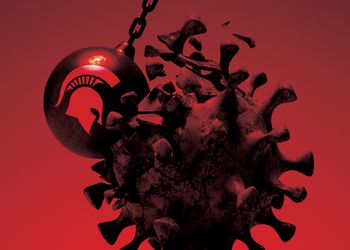Spartans Answering the Call
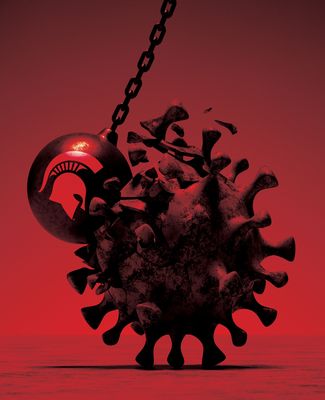
Spartans Answering the Call
Spartans rise to the occasion as the coronavirus pandemic presents unique and new challenges around the world.
July 21, 2020As the coronavirus pandemic has swept the globe, families, communities and companies have faced some of the biggest challenges of our time. Spartans, naturally, have stepped up to help, both personally and professionally, whether they work in a medical field, in business or in government. While it would be impossible to showcase every Spartan who is rising to this historic moment, the following stories and profiles highlight some of the remarkable work we’ve heard about that MSU alumni have been part of around the world. The impact of COVID-19 continues to evolve, but throughout it all, Spartans have shown that they are ready to help in the fight.
Heroes of the Pandemic
Whether a first-year nurse or an infectious disease expert, Spartans on the front lines of the coronavirus pandemic were thrust into life-saving roles. They responded resoundingly, using their knowledge, training and skills to comfort, protect and inform.
Mia Taormina
Osteopathic Medicine, D.O. ’04 – Physician
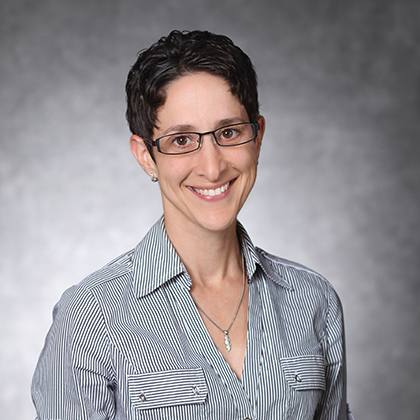 For Dr. Mia Taormina, each day of the coronavirus pandemic so far has been pretty much the same. She wakes up, takes her 6-yearold daughter to day care (she qualifies for emergency child care) and hits the ground running at her job. Taormina is an infectious disease specialist serving multiple hospitals at Edward-Elmhurst Health in the Chicago suburbs. Once the pandemic reached Illinois, Taormina was seeing about 40 patients per day, seven days a week—and 90% of those patient visits were COVID-19 related. Between patients, Taormina was on a conference call each day with other members of the hospital organization to discuss everything related to COVID-19—from strategy and cutting-edge treatments to how many gloves and N95 masks the hospital system had. Even after she went home at night, she made calls to COVID patients who were not hospitalized and sent informational emails to hospital staff before finally closing her eyes. Then she woke up the next morning and did it all over again. “It feels like the longest week ever,” Taormina said, but she had no plans of slowing down. Taormina plans to keep fighting until the coronavirus is no longer affecting daily life. “I somehow feel that my contribution is getting us closer to the finish line,” she said. “And I do know that I don’t plan on stopping until I really know that it’s over.” While Taormina said in May that she doesn’t think the pandemic will end soon, she urged everyone to look to experts for guidance and to read articles with primary sources. That, she said, is how the world will inch back toward normal.
For Dr. Mia Taormina, each day of the coronavirus pandemic so far has been pretty much the same. She wakes up, takes her 6-yearold daughter to day care (she qualifies for emergency child care) and hits the ground running at her job. Taormina is an infectious disease specialist serving multiple hospitals at Edward-Elmhurst Health in the Chicago suburbs. Once the pandemic reached Illinois, Taormina was seeing about 40 patients per day, seven days a week—and 90% of those patient visits were COVID-19 related. Between patients, Taormina was on a conference call each day with other members of the hospital organization to discuss everything related to COVID-19—from strategy and cutting-edge treatments to how many gloves and N95 masks the hospital system had. Even after she went home at night, she made calls to COVID patients who were not hospitalized and sent informational emails to hospital staff before finally closing her eyes. Then she woke up the next morning and did it all over again. “It feels like the longest week ever,” Taormina said, but she had no plans of slowing down. Taormina plans to keep fighting until the coronavirus is no longer affecting daily life. “I somehow feel that my contribution is getting us closer to the finish line,” she said. “And I do know that I don’t plan on stopping until I really know that it’s over.” While Taormina said in May that she doesn’t think the pandemic will end soon, she urged everyone to look to experts for guidance and to read articles with primary sources. That, she said, is how the world will inch back toward normal.
Abby Nowicki
Education, ’18; Nursing, ’19 – Nurse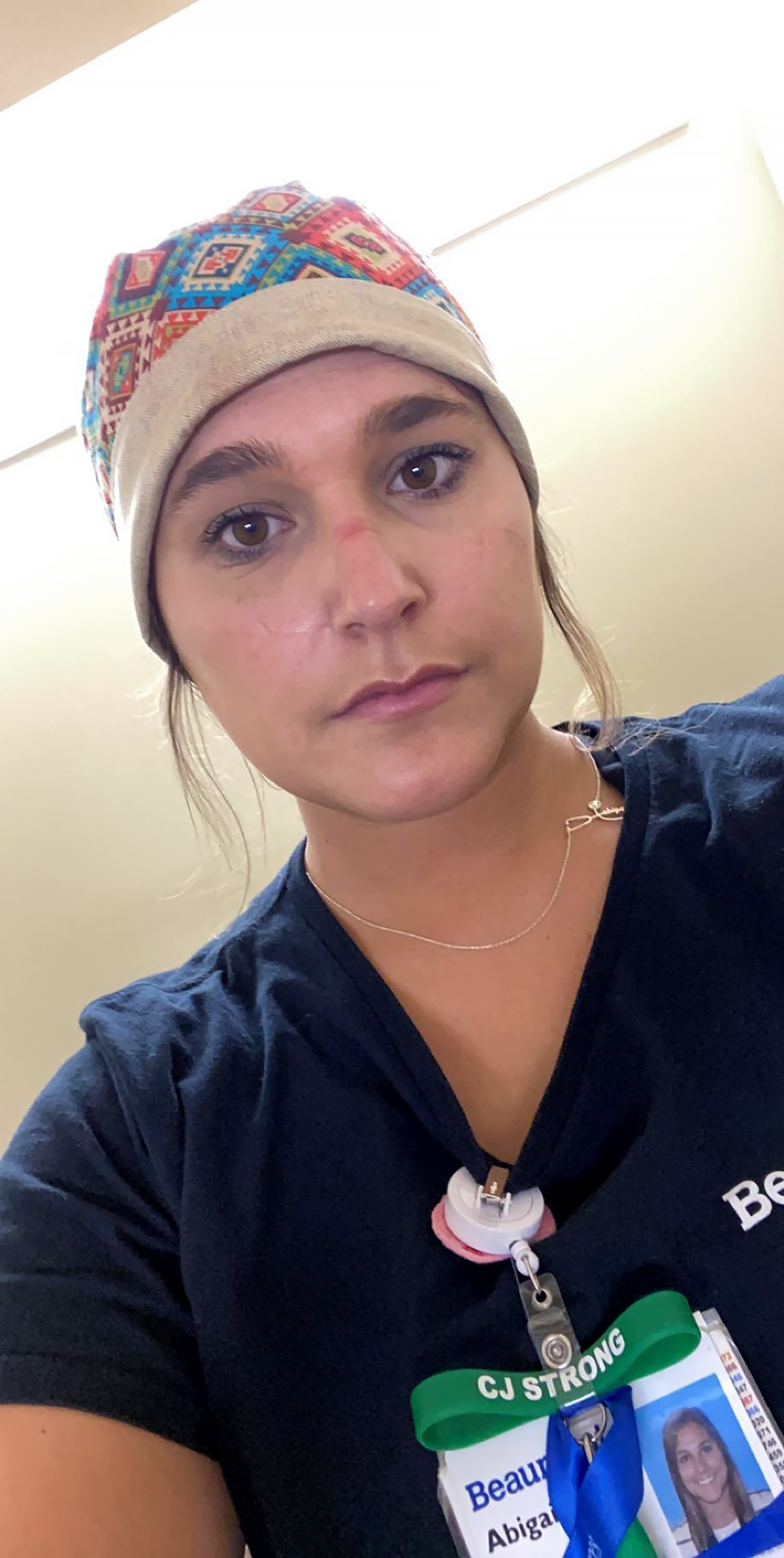
Abby Nowicki never thought that, less than a year into her career as a nurse, she would face a pandemic. Since it began, Nowicki, who works at a hospital in Southeast Michigan, has thought about calling it quits more than once. She was overwhelmed by how immense it all was in one of the country’s hot spots. “We got overrun,” Nowicki said. Patient after patient would enter the emergency room with mild COVID-19 symptoms and then deteriorate rapidly. Drawing on the strength of her co-workers and her own urge to fulfill her duty, Nowicki kept showing up for her patients. “I truly feel that my time at MSU prepared me for all of this,” she said. “It taught me to stand tall on my own belief and it taught me that I am confident enough to get through this.” She was still getting through it as the summer months approached. Seeing the number of cases in the hospital fall has also helped buoy her. Now that she’s faced a pandemic, she has also learned how to get through one.
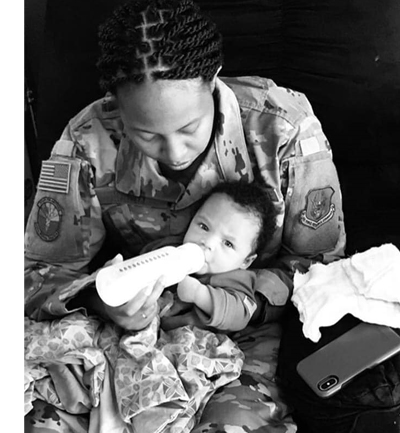
Paris C. Mandy, MSN, RN
Social Science, Psychology, ’08 – Nurse, Air Force Reserve
Paris Mandy believes in service to her family, community and country. Nearly seven weeks into the COVID-19 pandemic, she was called upon as a member of the Air Force Reserve Command to help with the fight against COVID-19 in New York City. Reservists normally have a few months’ notice prior to their deployment so they can plan for their civilian employers and families. Paris was among a pool of individual reservists with specialized medical skills who volunteered for mobilization in the initial wave of deployments for the Air Force Reserve. This allowed the Air Force to activate her mission much quicker–she only had a few days to get ready. “I take my responsibility as a reservist very seriously and while it was beyond difficult to leave my three-month-old baby, I knew I was needed across the country,” she said. After 9.5 weeks of service plus 14-days of quarantine, Paris returned home to her now six-month-old baby girl. As an emergency department nurse at Banner Thunderbird Medical Center, she is now joining another local fight against the virus in Phoenix, Arizona.
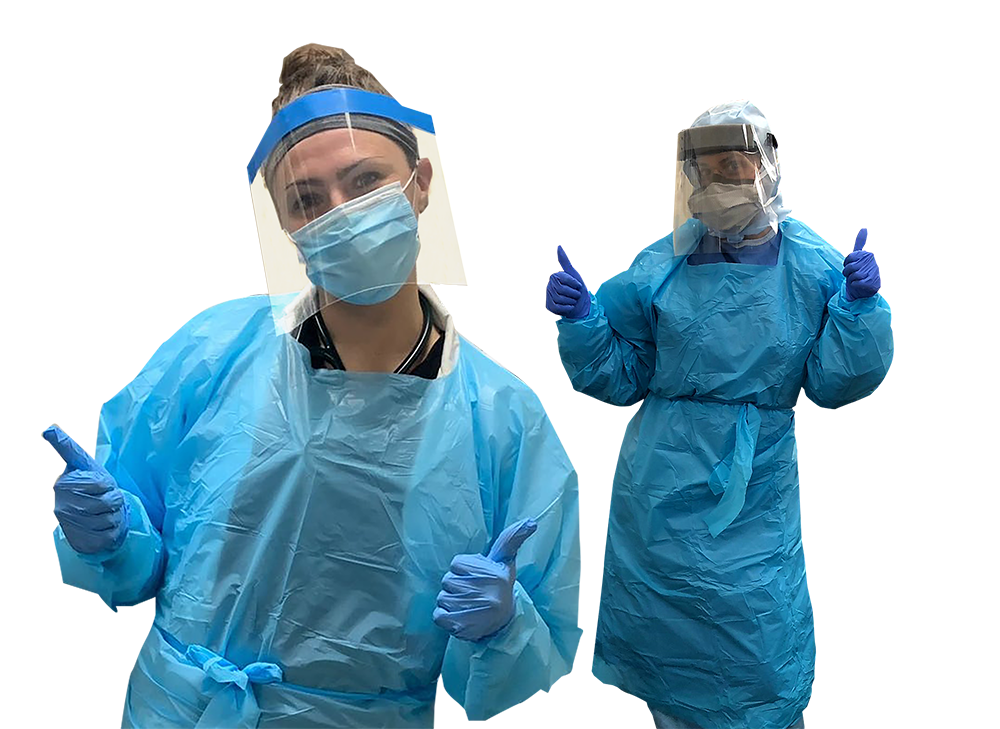
Stephanie Yuhasz Machak
Social Science and Nursing, ’07 – Nurse anesthetist
Abby Barker
Education, ’15 – Physician assistant
Stephanie Yuhasz Machak and Abby Barker didn’t know it when they played field hockey at MSU, but their athletic careers helped prepare them for work on the front lines in the fight against the coronavirus. Machak, who was a goalie on the team before graduating in 2007, is a nurse anesthetist at C.S. Mott Children’s Hospital at the University of Michigan. Barker, who was an All-American in 2014, is a physician assistant at two hospitals in inner-city Columbus, Ohio. “If you work in the emergency room or the ICU, they call you adrenaline junkies,” Machak told the Lansing State Journal, “because you have these moments where you have to make these split-second decisions and your heart rate is up and people are looking at you like, ‘What do we do?’” The two had to react quickly as COVID-19 made its way through their hospitals. The atmosphere was not far from the fast-paced game of field hockey—only it was not a game. “It’s not just a goal going in the net,” Machak said. “At this point, it’s someone’s life.” With such high stakes, Machak and Barker took solace in knowing they were ready to handle whatever was thrown at them.
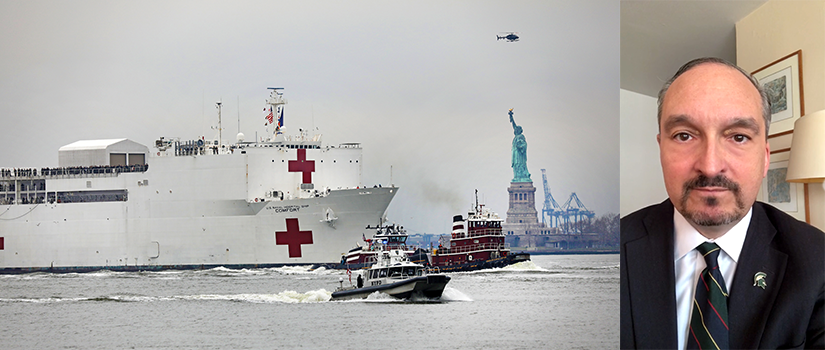
Kevin Clark
James Madison, ’87 – Emergency services manager
As an operations manager at NYC Emergency Management, Kevin Clark is used to everevolving job duties. When many in his office were sent home to work after the coronavirus entered the New York region, Clark was thrust into yet another new role—and he was happy to pick up a job in the field. Clark helped with the logistics in bringing the hospital ship USNS Comfort to New York and assisted in setting up a field hospital at the Javits Center in the city. NYC Emergency Management worked with members of the U.S. Armed Forces, including the Navy, Marines, Department of Defense and National Guard to support New York’s medical systems.
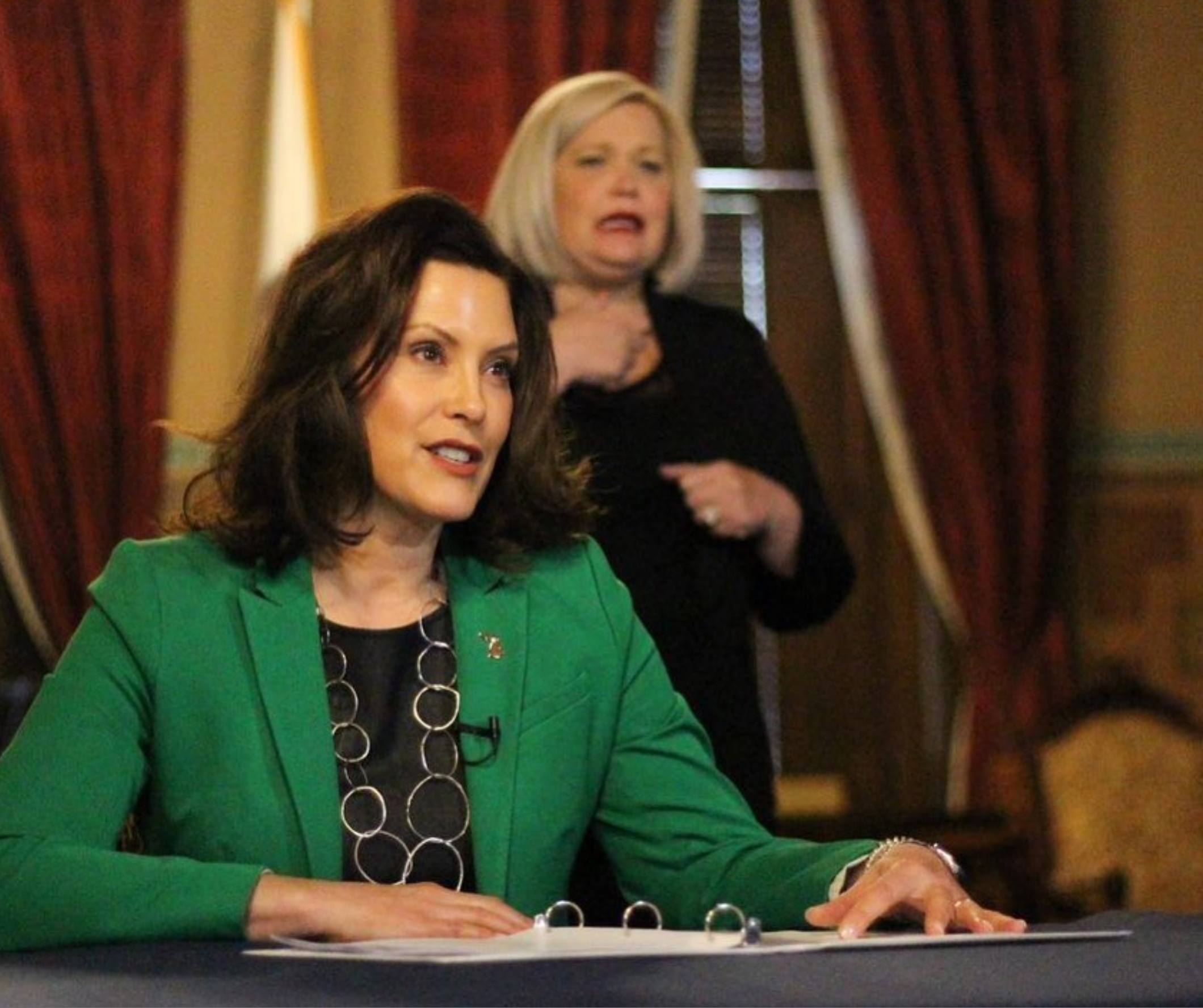
Gretchen Whitmer
Communication Arts and Sciences, ’93; Law, J.D. ’98 – Governor
“My number one priority is the health and safety of Michiganders,” Gov. Gretchen Whit - mer said in a statement, “and I will continue to work tirelessly to protect both lives and livelihoods.” Making difficult decisions, Whitmer has led Michigan as the pandemic ravaged pockets of the state. With no end to the pandemic in sight and many tough decisions still ahead, Whitmer’s leadership is key to moving Michigan forward.
 Gustav J. Lo
Gustav J. Lo
Human Medicine, M.D. ’88 – Hospital leader
Compared to the southern part of the state, early cases of COVID-19 in northern Michigan were minimal. That didn’t stop Dr. Gustav Lo, medical director of Northern Michigan MedCenter, from taking precautions. Lo and his team acted quickly, obtaining 30 COVID-19 swab test kits from an FDA-approved private laboratory by March 20. On top of that, the NMMC employed an alternative test—one that required only saline and a sterile container. Being ahead of the pandemic was the best way to fight it. Lo helped position northern Michigan communities ahead of the curve.
The Industrious Front Line
Whether providing food to Michiganders in need or making personal protective equipment for frontline workers, working outside of the health care industry has not stopped Spartans from doing what they can to help. Businesses large and small have gotten creative—that’s what Spartans do.
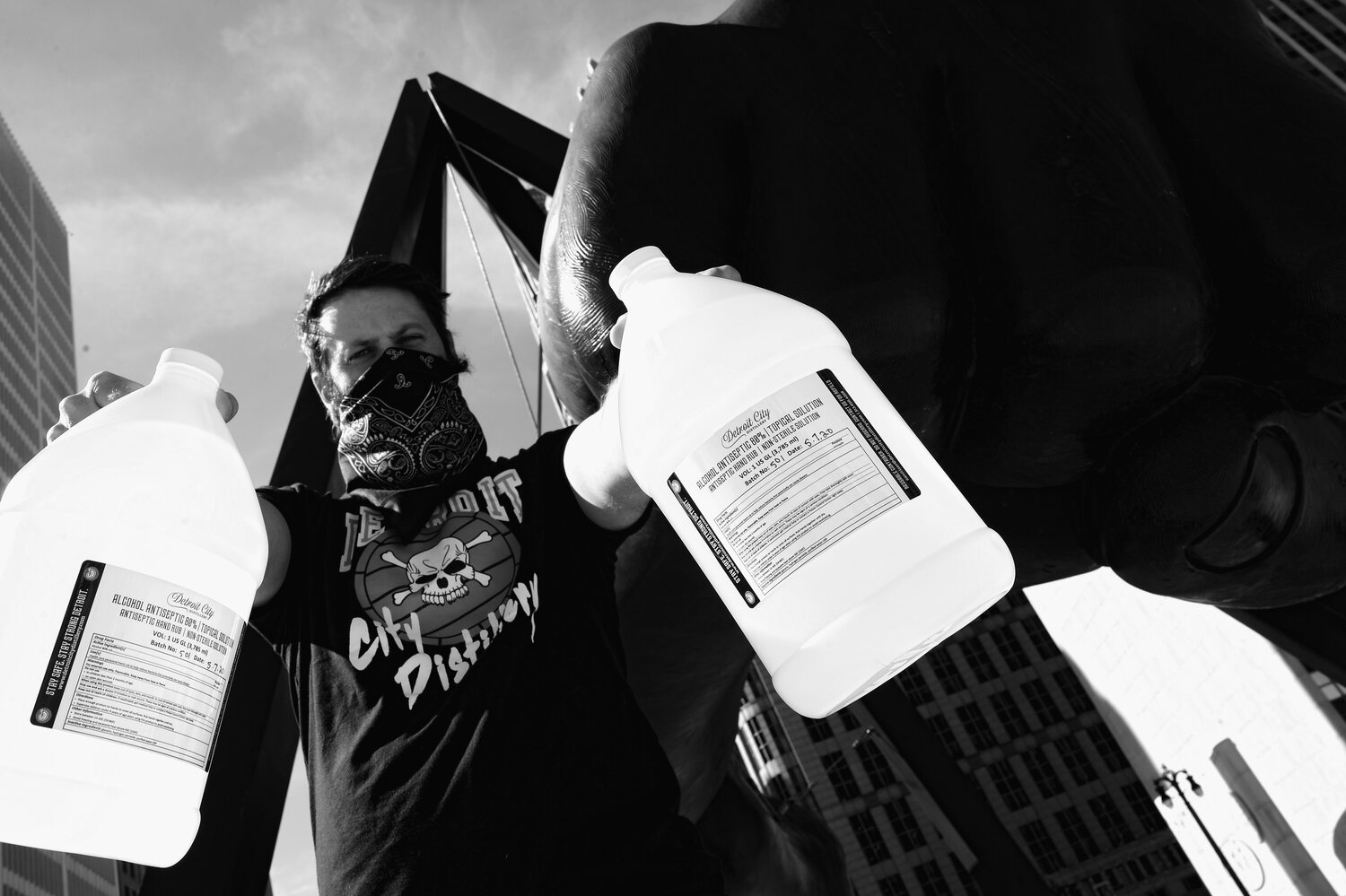
John Paul Jerome
Natural Science, Ph.D. ’12 – Detroit City Distillery
Mike Forsyth
Agriculture & Natural Resources, ’05; Social Science, MURP ’08 – Detroit City Distillery
The stay-at-home order in Michigan did not slow down John Paul Jerome, the master distiller at Detroit City Distillery. Instead, work picked up at the craft-spirit maker’s Detroit factory as workers used the company’s still to produce more than 15,000 gallons of hand sanitizer as of early May. Along with co-founder Michael Forsyth, Jerome and the Detroit City Distillery team supplied the Detroit Police Department with hand sanitizer and distributed thousands of gallons to hospitals and clinics throughout the state. “We had an opportunity to help,” Jerome said. “So why wouldn’t we?” Jerome and Forsyth had some fun while hustling to produce the sanitizer, too. They bottled a special-edition “Shutdown Bourbon” available for sale via curbside pickup in May. It sold out in less than a week.
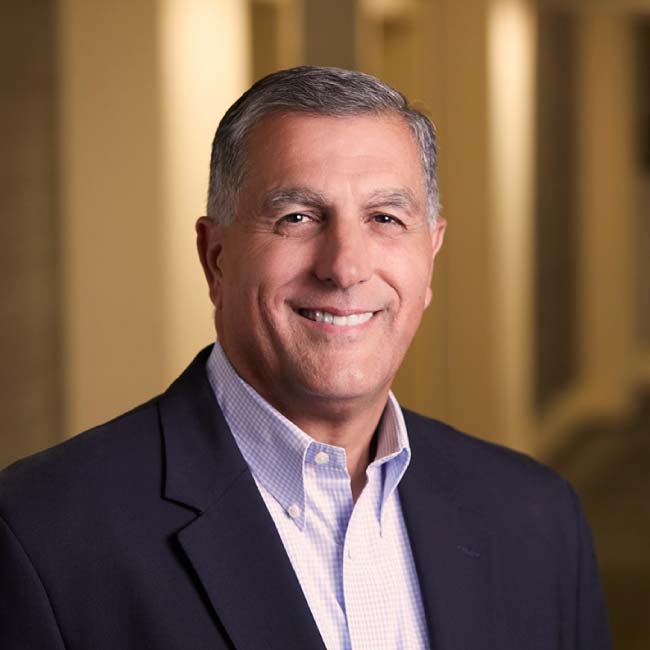 Phil Fioravante
Phil Fioravante
Engineering, ’84 – Creative Foam Corp.
In normal times, Phil Fioravante’s Creative Foam Corp. would be competing against other parts suppliers for a chance to work with General Motors Co. But during the pandemic, everyone put aside their business rivalries and worked together. So, when GM devised a plan to manufacture 200,000 ventilators in March, Creative Foam took its spot on the production line, producing the foam parts for the GM ventilators.
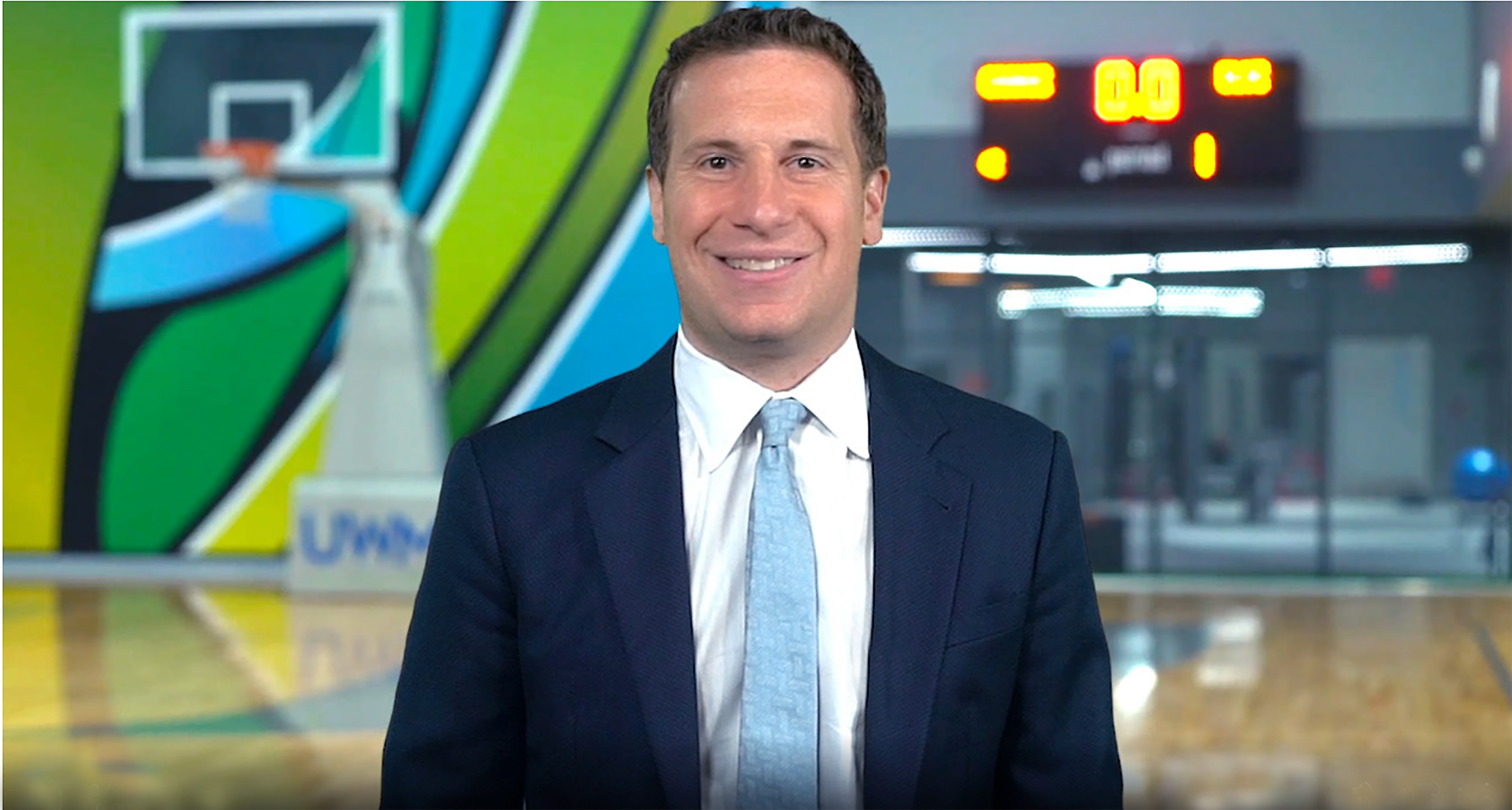
Mat Ishbia
Business, ’03 – United Wholesale Mortgage
During his time at MSU, Mat Ishbia was known as a bench player on the 2000 National Championship basketball team. Today, he’s the chief executive officer at United Wholesale Mortgage, which is the nation’s No. 2 overall lender and the largest wholesale lender, according to HousingWire. Ishbia remains team oriented. “We are family,” he told his employees during a companywide video call in April as the coronavirus wreaked havoc on the economy. Then he promised that all 5,800 jobs in the company were safe. “There will be no layoffs. I will sleep on your couch before I lay anyone off,” Ishbia said. “We’re going to do this together. If this month sucks, and next month sucks, I don’t care. No one is losing their job. No one on this call is losing their job.”
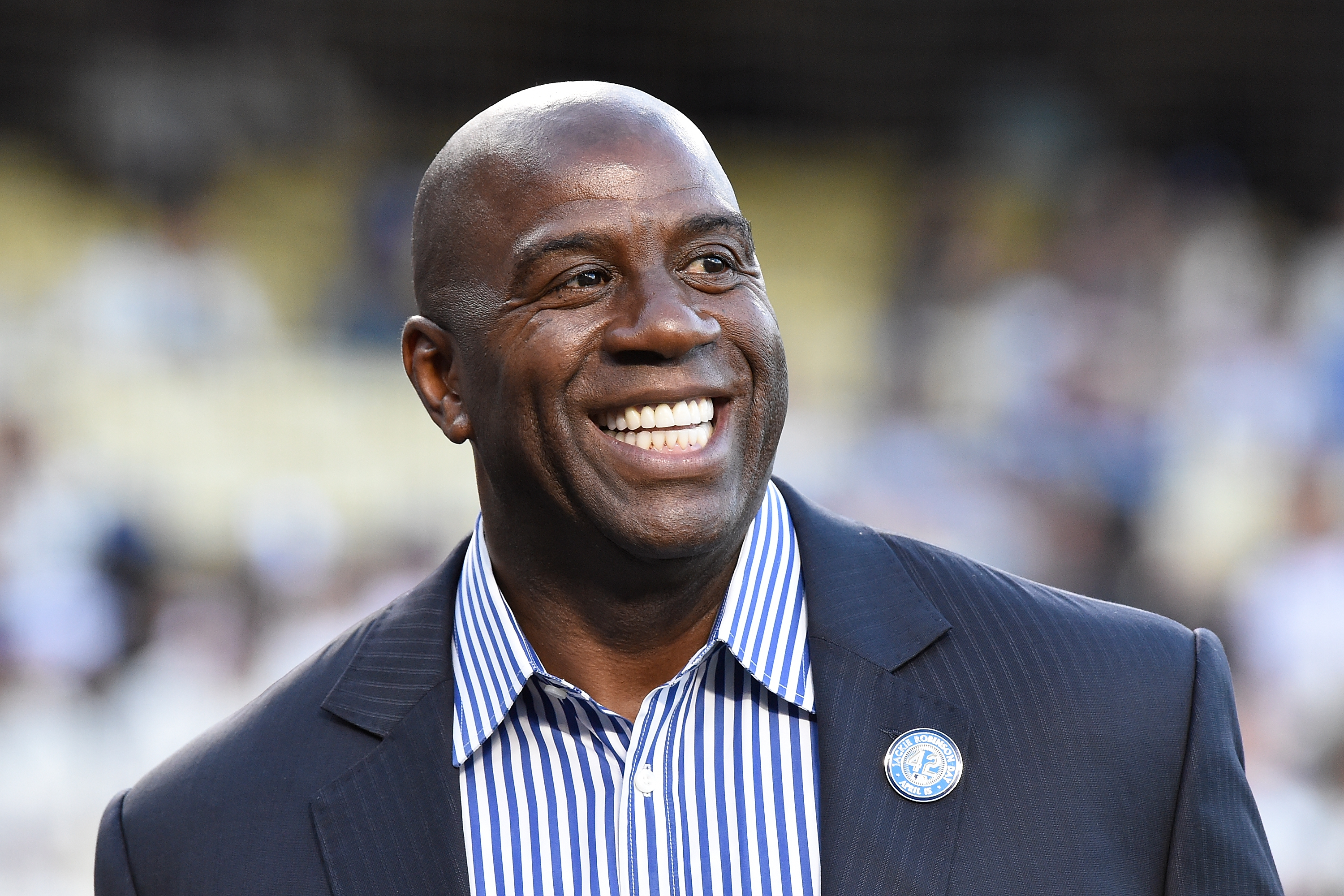 Earvin ‘Magic’ Johnson
Earvin ‘Magic’ Johnson
Honorary Doctorate of Business, ’10 – Magic Johnson Enterprises
The Spartan community is more than familiar with the influence and determination of Earvin “Magic” Johnson. So it’s no surprise that he stepped up to fund $100 million in loans for minority- and women-owned businesses through his insurance company, EquiTrust Life Insurance Co. The loans will be distributed through the Small Business Administration’s federal Paycheck Protection Program in partnership with MBE Capital Partners, a New Jersey-based nonbank lender that works closely with minority-owned businesses. In general, if companies retain their workforces, PPP loans can function more like grants, backed by the SBA. Johnson’s funding will reportedly go toward some 5,000 loans that have already been approved. Thanks to Johnson, recipients of the loans will gain access to capital that they’ve been unable to secure from major banks and credit unions.
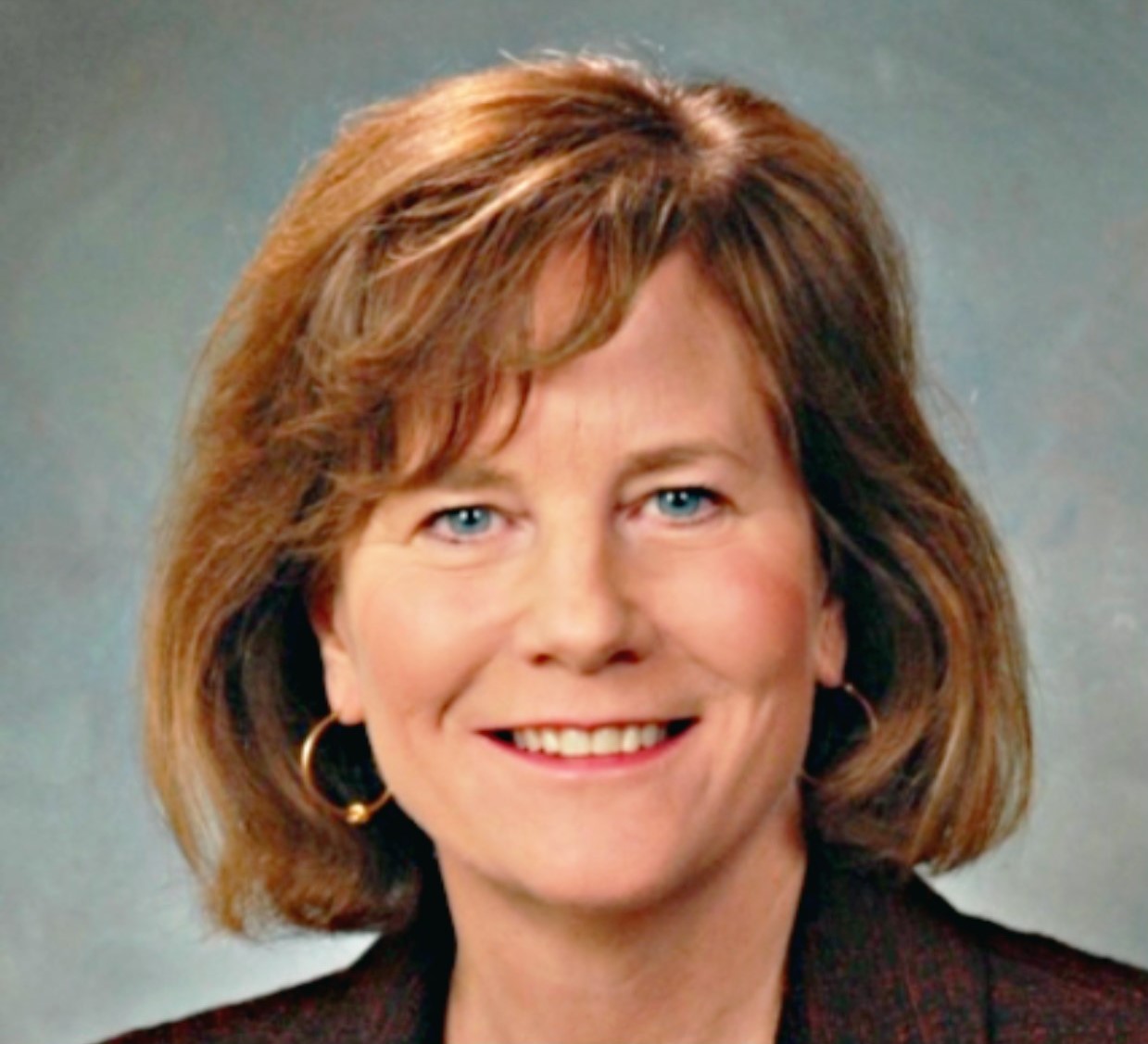 Linda Hubbard
Linda Hubbard
Business, ’82 – Carhartt
Linda Hubbard, Carhartt’s president and chief operating officer, knew the company would help once the pandemic hit. “Since Carhartt was founded in 1889, we have been committed to serving and protecting hardworking people,” she told the MSU Broad College of Business. So, when needed, Carhartt shifted its manufacturing operations to produce 2.5 million medical masks and 50,000 gowns for critical workers. Carhartt halted production of new inventory to create the masks and gowns in its facilities in the United States and Mexico. Hubbard said Carhartt had a duty to live up to its past: “Answering the call during times of need has always been an integral part of Carhartt’s history.”
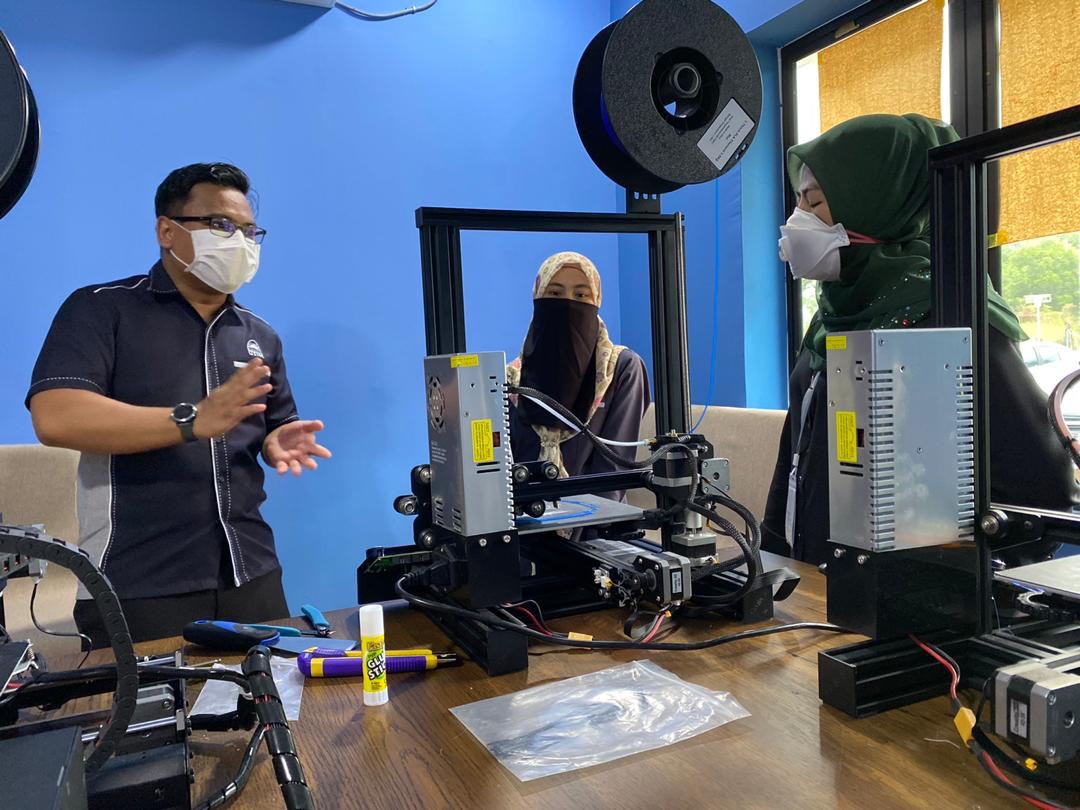
Mohd Ifwat Mohd Ghazali
Engineering, M.S. ’14; Ph.D. ’19 – Universiti Sains Islam Malaysia
Mohd Ifwat Mohd Ghazali is a senior lecturer at Universiti Sains Islam Malaysia in Nilai, Malaysia. When strict quarantine measures were enacted in the country, he had some time on his hands. He knew personal protective equipment was in high demand, so he brought together a team to produce low-cost face shields. Ghazali specialized in 3D printing/additive manufacturing while studying electrical engineering at MSU, and he put his experience to good use: Ghazali and his team made face shields using 3D printers. They also created a network of approximately 4,000 people across Malaysia who had 3D printers to create and send PPE to hospitals, clinics, quarantine centers and police departments. The masks contributed to the flattening of the curve in Malaysia, and Ghazali was happy to be a part of it. “As a Spartan, I put my experience to good use in this crazy time,” Ghazali told MSU International Studies & Programs.
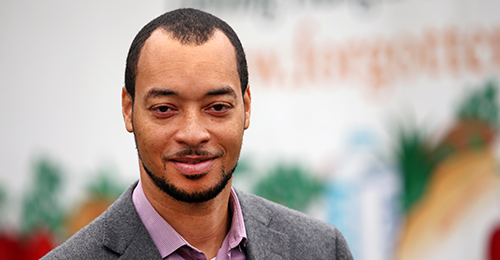
Kirk Mayes
Communication Arts and Sciences, ’99 – Forgotten Harvest
Forgotten Harvest is one of the largest food organizations in the country. It has been redirecting food that would end up in the waste stream to Michiganders in need for 30 years, sourcing food from grocery stores and large corporations. When the pandemic hit the Detroit area, Forgotten Harvest CEO Kirk Mayes acted quickly. The organization partnered with the city of Detroit to help local restaurants donate their surplus to people and families in need during the coronavirus outbreak. Forgotten Harvest did have to adjust how to deliver food to those in need during the outbreak, creating a supersite model where workers set up a mobile pantry that parked at 15 pop-up sites to distribute food boxes. “Not doing our job is not an option,” Mayes told the Michigan Chronicle. “We had to find a new way to service the community.”
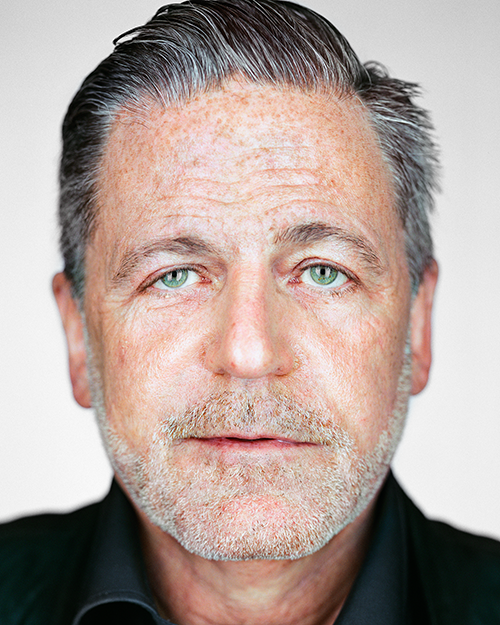 Dan Gilbert
Dan Gilbert
Communication Arts and Sciences, ’83 – Bedrock
When Dan Gilbert started Bedrock, a Detroit-based real estate firm, in 2011, he wanted to be there for small businesses. He made good on that promise in 2020, when, because of the economic hit fueled by the coronavirus pandemic, Bedrock announced that it had waived all rent, expenses and parking fees for restaurants and retail tenants that qualified as “small businesses” for the months of April, May and June.
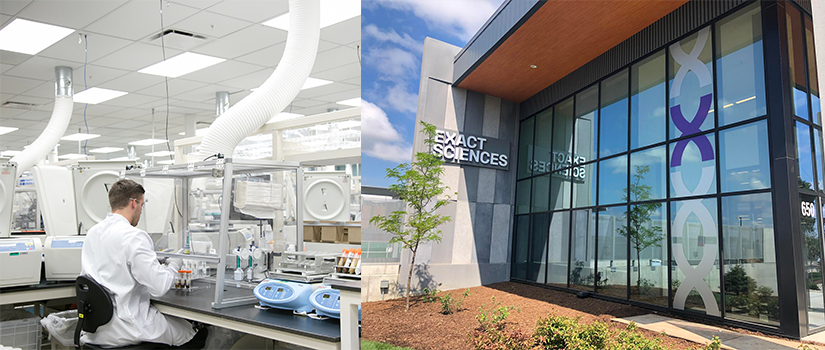
Kevin Conroy
Engineering, ’88 – Exact Sciences
To keep up with coronavirus testing needs, states asked for help from private companies. Exact Sciences partnered with the state of Wisconsin to bolster testing capabilities. Exact Sciences is best known for Cologuard, an at-home colon cancer screening test. CEO Kevin Conroy said in a statement that Exact Sciences adapted its technology to test people for the new coronavirus, giving the state much-needed relief. “It takes people, it takes great science, and it takes incredible equipment and engineering and software,” he said. He was happy to offer all of those things to become a resource to run millions of tests.
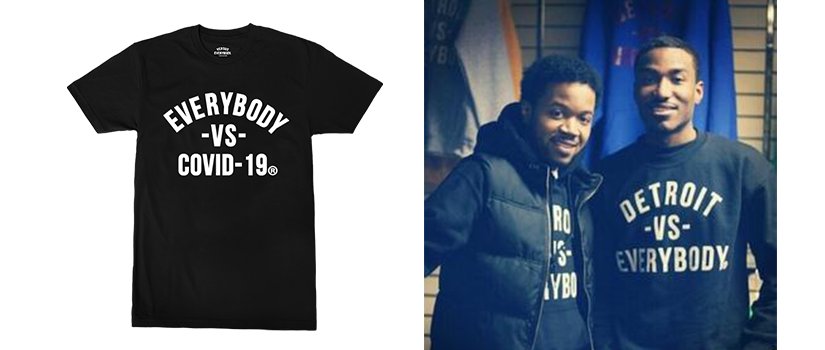
Sean Williams
Social Science, ’10 – Detroit Vs Everybody
Sure, it’s Detroit Vs. Everybody, but it’s also Everybody Vs. COVID-19. That’s the way Sean Williams and the folks at the Detroit Vs. Everybody clothing line feel, at least. With the company’s brick-and-mortar stores closed during the pandemic, creating the COVID-19 shirts and hoodies was one way to boost sales. But, more importantly it was a way for Williams to support the fight with 20% of proceeds going to the Detroit Small Business Stabilization Fund. The COVID-19 shirt struck a nerve. Michigan’s Lt. Gov. Garlin Gilchrist wore it over a button-down shirt as he presided over the Michigan Senate in April.
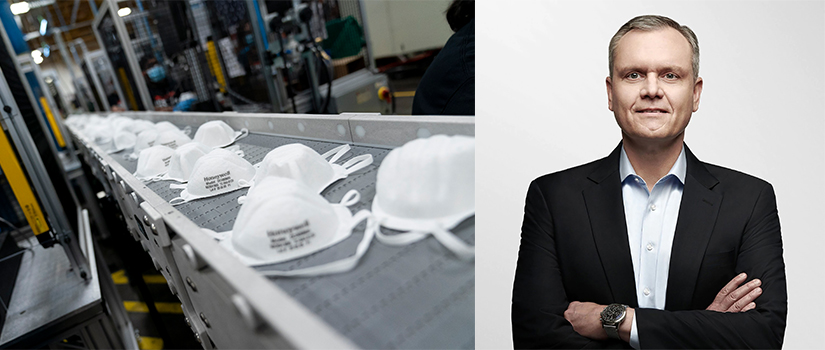
Darius Adamczyk
Engineering, ’88 – Honeywell
When the federal government asked for help, Honeywell was quick to respond. The company rapidly converted one of its facilities to manufacture N95 masks. Darius Adamczyk, CEO of Honeywell, was eager to help, and manufacturing masks that are critical to health care workers was the perfect solution. “The decision was a very easy one for Honeywell,” Adamczyk wrote in a statement, “mainly because we already had several solutions in place that we knew would be helpful. For example, we were already a manufacturer of N95 respirator masks, but we have been able to very quickly start up two new production lines in the U.S., one in Rhode Island and one in Arizona, which will produce 20 million masks per month.”
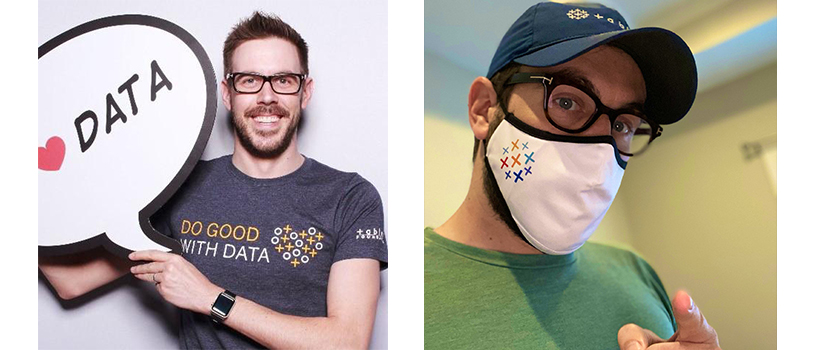
Jeremy Blaney
James Madison, Honors College ’10 – Tableau Software
As a Customer Success leader at Tableau for the public sector, Jeremy Blaney has been a strong partner to government in driving forward digital transformation initiatives. Most recently, Jeremy led data strategy for the Tableau COVID-19 Data Hub, a free resource that government leaders and the public are using to lead through change and make data-driven decisions in the context of the outbreak. For this, Jeremy created several curated COVID-19 data sources, which have been accessed more than 400,000 times. Jeremy also partnered with system integrators to develop plug-and-play solutions to help government organizations kick-start their data-driven response in the areas of human resources, public health, and more.
Author: Liam Boylan-Pett

